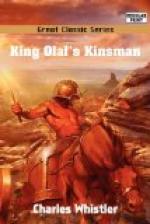“It is my father’s sword,” I said. “It has come back to me, even as you said it would.”
“They have not said too much of sword Foe’s Bane,” Ottar answered. “For I have seen you use it—and I think that Hneitir is hardly more handsome.”
Now came that which is the most terrible part of a battle, even for the victors, and that is the calling of the roll. And sad enough were we when that was done, for the loss was heavy. Yet what the loss was to the Danes I cannot say, for our men chased them till there were no two left together to make a stand among those who had not found safety in the woods that fringe the heath.
Then we bore back our wounded—and they were many—to Bures, and it was noonday when we reached there. But there was no rest for Olaf yet, for Colchester must be barred against the Danes.
He and I therefore took a hundred of our men, mounting them on the freshest of the horses, and covered the nine miles between us and the town as quickly as we might. Very fair the old place looked to me as we crossed the Colne and saw the walls among the trees on the steep hillside, and the houses nestling against it. The gates were shut, and there was a strong guard along the ramparts on either side, and we halted and summoned the townsfolk to surrender to Ethelred in peace.
Doubtless some flying Danes had brought news of how the battle had gone, for at once the gates were opened to us, and the chief men came out and prayed for favour at Olaf’s hands, and he told them that Ethelred their king would take no revenge on them for having bowed to Swein and his mighty force. So there was rejoicing in Colchester, for it seemed to the townsfolk that peace had surely come at last, and with it relief from the oppression of the thingmen. For these warriors had carried matters with a high hand, so that no Anglian dared to call them aught but lord—it must be “lord Dane” if they spoke even to the meanest of the hosts and the gravest burgher must give way to some footman of Swein’s if they met in street or on bridge. So they were not loved.
Olaf bade the townspeople prove their loyalty by taking all the Danish warriors who were in the place, and bringing them to him on the market hill where the great roads cross. Then was fighting in Colchester for a while, but in the end, towards sunset, there was a sullen gathering of them enough, and many were wounded.
Then the king went and spoke to them.
“What think you that I will do to you?” he asked.
“Even as we would do to you,” one said.
“Hang me, maybe?” said Olaf.
“Aye, what else?” the man answered in a careless way, but looking more anxious than he would wish one to see.
“I do not hang good warriors,” the king said. “What would you do if I gave you life?”
“What bargain do you want to make?” said the Dane.
“If I put you into a ship and let you go, will you promise to take a message for me to Cnut, and not to come back to England as foes?”




